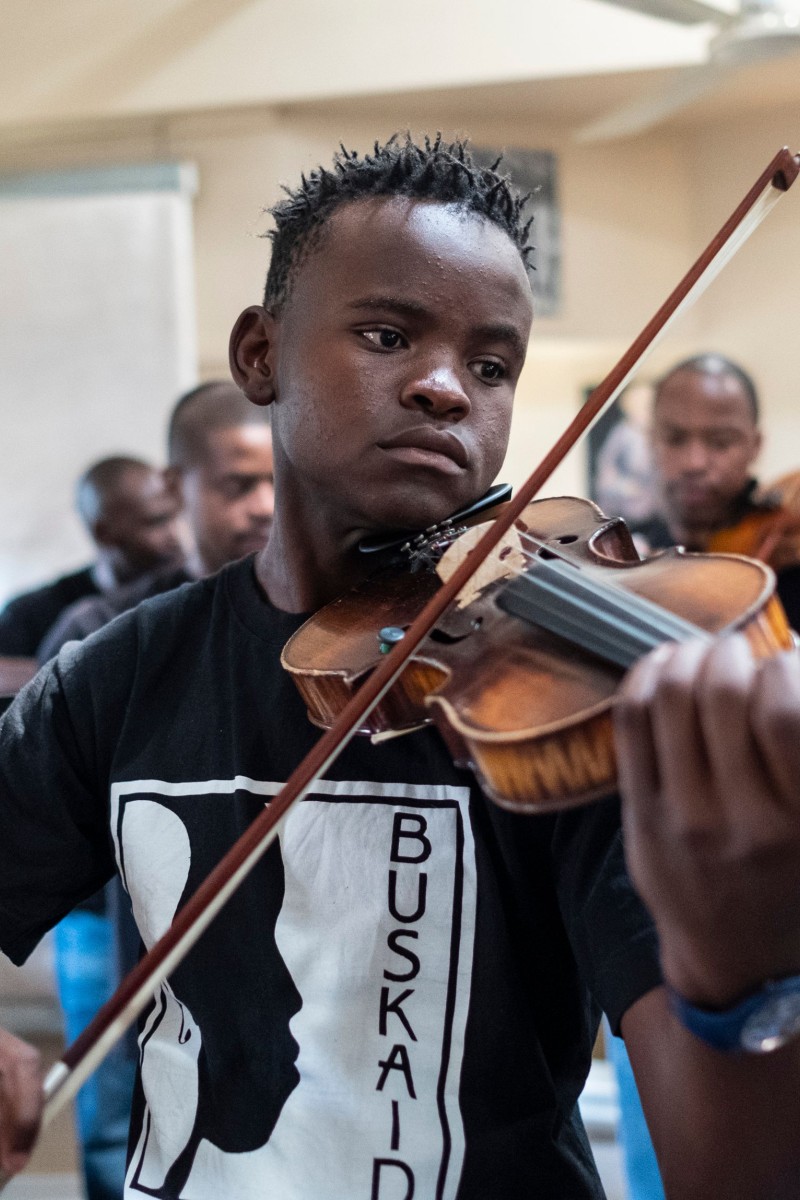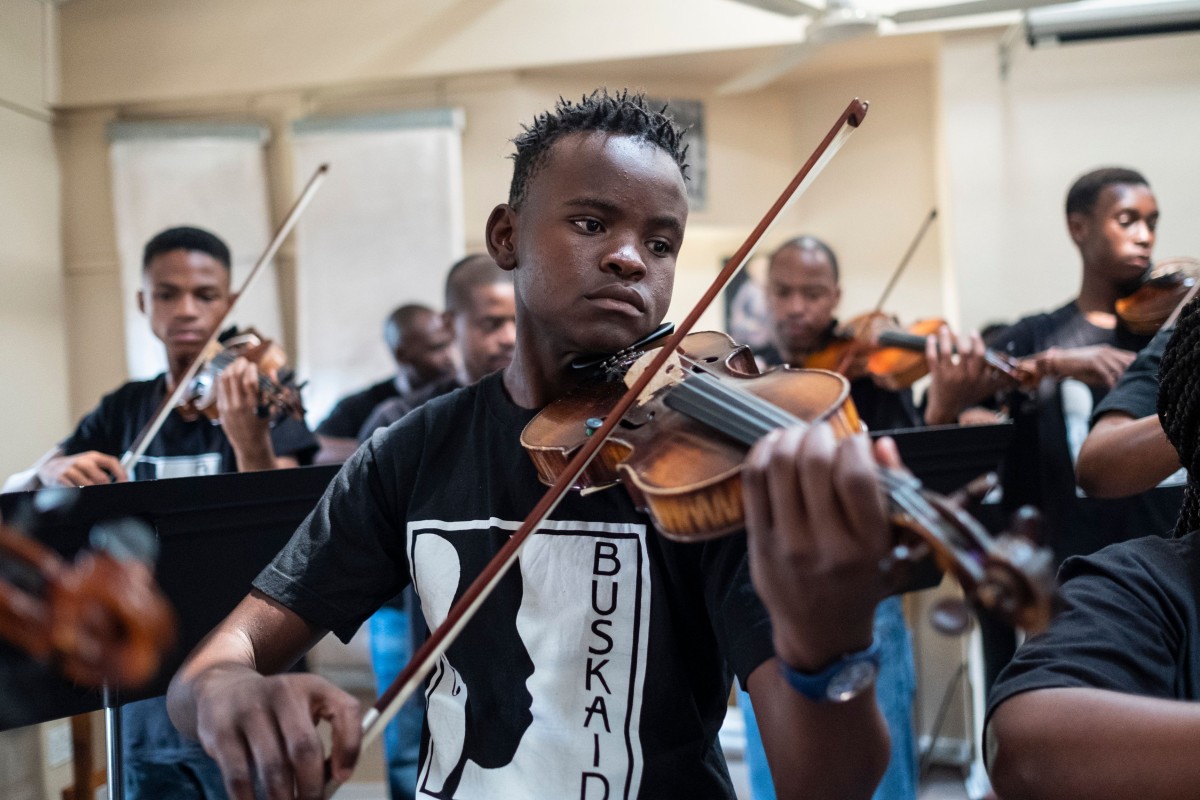
Buskaid, a school in Soweto, Johannesburg, introduces young people to the inspirational power of musical instruments
 Xolani Zingeni has been playing the violin for three years at Buskaid.
Xolani Zingeni has been playing the violin for three years at Buskaid.Xolani Zingeni practises the violin while looking out at the muddy courtyard. His teenage sister washes laundry in a tub and his great-grandmother carefully hangs it on a washing line.
“When I play, it helps me to forget about the situation I am in,” says the 16-year-old South African.
Xolani’s life is filled with uncertainty. His mother is sick, so he mostly lives with his great-grandmother in Soweto, a poor urban settlement, or “township”. His father is not around.
This way of life is tiring for Xolani, who is the second brother of five children, all with different fathers.
Classical music has been his escape for three years.
He has joined dozen of other young people from the poor neighbourhood who have started playing the violin, cello or double bass at a school called Buskaid. It was set up specifically for black township children.
A rare opportunity
Under apartheid, the system of racial segregation in South Africa that lasted until the 1990s, there were very few opportunities for black children to study music.
The biggest orchestras and opera companies in the country only allowed white musicians to play in them. Some even claimed that black people preferred “warrior dances”.
Since South Africa became a democracy in 1994, society has been slowly progressing.
In 1997, a British woman named Rosemary Nalden founded Buskaid. She set it up in the grounds of a church in Soweto. Xolani spent three months patiently waiting outside every day, until he was finally accepted into it.
“I saw [the violin] in a text book. I just wanted to touch it,” he says.
“The first day I came, they did not take me so I kept coming.”
And then Nalden took a shine to Xolani.
“I stuck [the violin] under his chin and I could see almost immediately that it just fit – it worked. He is physically talented and he is musical and he’s got guts,” she says.
Striving for excellence
It’s hard to believe that Xolani is still a beginner; his movements are smooth and his tone is confident.
Xolani’s great-grandmother, who looks after the family with just US$170 (HK$1,300) a month, smiles.
“I would like his sisters and brothers to go to Buskaid. It keeps them away from the streets, it prevents them from fighting, drinking beer and taking drugs,” says Flora Vuvama, 83.
Buskaid has 125 students aged between six and 35. They study after school, at weekends and during holidays.
While it provides a safe space for at-risk youth, the centre is above all a school of excellence.
“It is a social programme but … the music part is of a very high standard,” says Nalden, 75, who runs the school with the help of teachers she has trained.
“It is not just a gesture … giving them an instrument keeps them away from the streets.”
“It is giving them an instrument to say: ‘This is very difficult, and you have to work extremely hard if you want to get anywhere’,” Nalden says.
For those who work hard, the results are impressive.
At weekly practices, the orchestra performs classical pieces like Mozart, as well as South African jazz.
The rhythm comes to them naturally, and sometimes they break into song and dance.
But Nalden is a tough critic. “It is so out of tune,” she says to the cello section. “We have a lot of work to do.”
The musicians are ready to rise to the challenge.
Playing on a world stage
Nalden runs a tight ship.
“If I don’t do my work, she is going to yell at me,” says Mzwandile Twala, who plays violin and, at 19, is one of the school’s youngest teachers.
“In my neighbourhood, you had to smoke to be popular … I am fortunate to have something else,” says the gifted musician, who dreams of studying in London, just like six other former Buskaid students. Three of them now play professionally.
“The violin has become part of me now, my other half.”
Students have to pay a small fee to attend the school, but it is mostly covered by donations.
The school has hundreds of instruments for beginners to use.
Former Buskaid pupil Gilbert Stoke, who plays the cello, is enthusiastic about the school. Now in his 30s and working in finance, he has performed around the world
with the organisation.
“People are shocked and delighted to see that we manage to sound like decent musicians,” he said.
“At home, we did not even call it classical music, but ‘violin music’. We saw it as the music of the rich white people.”
Edited by Charlotte Ames-Ettridge
You might also like:
Classical music for beginners: A guide for the newbie who's been too intimidated to ask
Great Escapes: cure your wanderlust in Cape Town, South Africa